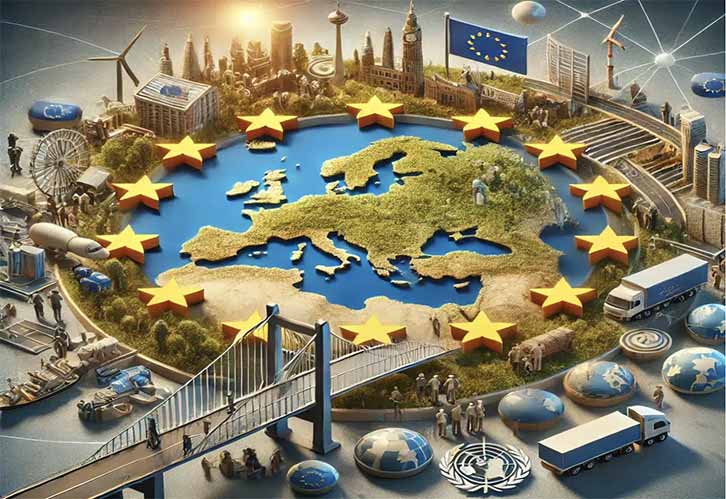Tra i programmi più vasti dell’Unione Europea, l’Interreg ha l’obiettivo di rafforzare la cooperazione tra diverse aree geografiche all’interno dell’Unione e con le regioni ultraperiferiche e i Paesi limitrofi. Nell’attuale periodo di programmazione 2021-2027, il sesto per l’esattezza (Interreg VI), con un budget di quasi 10 miliardi di euro e circa 100 programmi, Interreg opera a livello transfrontaliero, sia all’interno che all’esterno dell’UE, contribuendo all’attuazione delle principali priorità della Politica di Coesione dell’UE, ponendo maggiore enfasi sulle sfide attuali, quali le transizioni digitale ed ecologica, e l’inclusione sociale.
Cos’è Interreg?
Interreg è un programma dell’Unione Europea che promuove la cooperazione tra regioni geografiche per superare le sfide comuni e migliorare la qualità della vita dei cittadini. Creato nel 1989, il programma mira a facilitare la collaborazione transfrontaliera, transnazionale e interregionale, sostenendo progetti che affrontano temi come lo sviluppo economico, l’innovazione, l’ambiente e l’inclusione sociale.
Storia di Interreg
Interreg nasce con l’obiettivo di eliminare le barriere tra le regioni europee e promuovere la coesione economica e sociale. Inizialmente concentrato su progetti di sviluppo regionale, il programma ha ampliato il suo raggio d’azione per includere anche la cooperazione con Paesi non UE, contribuendo alla stabilità e alla crescita delle aree limitrofe.
Obiettivi di Interreg
Gli obiettivi principali di Interreg includono il rafforzamento della coesione territoriale, l’incremento della competitività delle regioni, la promozione della sostenibilità ambientale e la facilitazione dell’inclusione sociale. Interreg cerca di affrontare le sfide comuni attraverso la cooperazione e lo scambio di buone pratiche tra le regioni partecipanti.
Il periodo di programmazione 2021-2027
Il periodo di programmazione 2021-2027, noto come Interreg VI, rappresenta la sesta fase del programma. Con un budget di quasi 10 miliardi di euro, Interreg VI si concentra su tematiche attuali come la transizione digitale ed ecologica, l’inclusione sociale e la resilienza delle comunità locali.
Budget e Finanziamenti
Interreg dispone di un budget significativo per il periodo 2021-2027, destinato a finanziare circa 100 programmi diversi. Questi fondi vengono utilizzati per sostenere progetti di cooperazione che affrontano problemi locali e transnazionali, favorendo lo sviluppo sostenibile e l’inclusione sociale.
Tipologie di Cooperazione
Interreg opera attraverso tre principali tipologie di cooperazione: transfrontaliera, transnazionale e interregionale. Ognuna di queste tipologie ha specifici programmi e obiettivi, ma tutte condividono l’intento di migliorare la coesione territoriale e la qualità della vita dei cittadini europei.
Cooperazione Transfrontaliera
La cooperazione transfrontaliera sostiene la collaborazione tra regioni di almeno due Stati membri diversi, situate direttamente sui confini o adiacenti ad essi. Questa forma di cooperazione mira a superare le barriere create dalle legislazioni nazionali divergenti e dalla mancanza di pianificazione territoriale comune.
Programmi dell’Unione Europea
Questi programmi si concentrano sulla trasformazione degli ostacoli alle frontiere in opportunità per gli Stati membri dell’UE. L’obiettivo è facilitare la collaborazione e lo sviluppo congiunto in vari settori, migliorando la qualità della vita nelle regioni di confine.
Interreg IPA
Interreg IPA sostiene la cooperazione tra l’UE e i Paesi candidati o potenziali candidati all’adesione, come l’ex Repubblica iugoslava di Macedonia, la Croazia e la Turchia. Questi programmi mirano a facilitare l’integrazione europea e a promuovere la stabilità e lo sviluppo nelle regioni limitrofe.
Interreg NEXT
Interreg NEXT opera ai confini esterni dell’UE, in particolare con i Paesi dell’Europa orientale e meridionale. In risposta all’aggressione russa contro l’Ucraina, la cooperazione con Russia e Bielorussia è stata sospesa, mentre si promuovono programmi di collaborazione con l’Ucraina e la Moldavia.
Cooperazione Transnazionale
La cooperazione transnazionale coinvolge regioni di diversi Paesi dell’UE, promuovendo la collaborazione su vasta scala per affrontare sfide comuni come l’innovazione, l’ambiente e lo sviluppo urbano.
Programmi continuativi
Questi programmi sostengono attività di cooperazione su larga scala, incoraggiando lo sviluppo regionale attraverso progetti congiunti e investimenti in vari settori chiave.
Programmi a supporto diretto
Programmi come Interreg Baltic Sea Region, Interreg Danube Region, Interreg IPA Adrion e Interreg Alpine Space forniscono supporto diretto alle strategie macroregionali, facilitando la cooperazione e lo sviluppo in specifiche aree geografiche.
Cooperazione Interregionale
La cooperazione interregionale copre vaste aree geografiche, promuovendo lo scambio di buone pratiche e l’apprendimento reciproco tra le regioni. Programmi come Interreg Europe, Interact, Urbact ed Espon giocano un ruolo chiave in questa tipologia di cooperazione.
Interreg Europe
Interreg Europe facilita la cooperazione paneuropea, incentivando lo sviluppo di buone pratiche e il trasferimento di competenze ed esperienze tra le regioni partecipanti.
Interact
Interact fornisce supporto tecnico e amministrativo ai programmi Interreg, facilitando l’implementazione e la gestione dei progetti di cooperazione.
Urbact
Urbact promuove lo sviluppo urbano sostenibile attraverso la cooperazione e lo scambio di esperienze tra le città europee.
Espon
Espon si concentra sulla ricerca e l’analisi delle dinamiche territoriali, fornendo dati e informazioni utili per lo sviluppo delle politiche regionali.
Cooperazione con le Regioni Ultraperiferiche
I programmi di cooperazione con le regioni ultraperiferiche dell’UE, come Interreg Oceano Indiano, Interreg Caraibi, Interreg Amazzonia, Interreg Canale del Mozambico e Interreg Madeira-Azzorre-Canarie, mirano a garantire la presenza europea in aree chiave e a promuovere lo sviluppo sostenibile e l’inclusione sociale.
Principali Progetti Finanziati
Interreg ha finanziato numerosi progetti di successo in tutta Europa, che hanno migliorato la qualità della vita dei cittadini e promosso lo sviluppo sostenibile. Esempi di progetti includono iniziative per l’innovazione tecnologica, la protezione ambientale e l’inclusione sociale.
Impatto di Interreg sui Territori
L’impatto di Interreg sui territori è significativo, con numerosi progetti che hanno contribuito allo sviluppo economico, sociale e ambientale delle regioni partecipanti. La cooperazione transfrontaliera, transnazionale e interregionale ha permesso di superare barriere e promuovere una maggiore coesione territoriale.
Focus sull’Inclusione Sociale
Uno degli obiettivi chiave di Interreg è promuovere l’inclusione sociale, garantendo che tutte le regioni e i cittadini possano beneficiare delle opportunità offerte dal programma. Progetti specifici sono stati implementati per affrontare le disuguaglianze sociali e migliorare l’accesso ai servizi essenziali.
Transizione Digitale ed Ecologica
Interreg supporta la transizione digitale ed ecologica attraverso progetti che promuovono l’innovazione tecnologica e la sostenibilità ambientale. Questi progetti mirano a creare un futuro più sostenibile e resiliente per le regioni europee.
Vantaggi per i Cittadini e le Imprese
I cittadini e le imprese traggono numerosi vantaggi dalla partecipazione ai progetti Interreg, che migliorano la qualità della vita e favoriscono lo sviluppo economico. La cooperazione transfrontaliera permette di superare le barriere amministrative e legislative, facilitando la mobilità e la collaborazione tra le regioni.
Sfide e Opportunità
Nonostante i numerosi successi, Interreg deve affrontare diverse sfide, tra cui la complessità amministrativa e le differenze legislative tra i Paesi partecipanti. Tuttavia, queste sfide rappresentano anche opportunità per sviluppare soluzioni innovative e promuovere una maggiore integrazione europea.
Casi di Studio
Numerosi casi di studio dimostrano l’efficacia dei progetti Interreg nel promuovere la cooperazione e lo sviluppo regionale. Esempi di successo includono progetti di innovazione tecnologica, protezione ambientale e inclusione sociale, che hanno avuto un impatto positivo sulle comunità locali.
Risultati Raggiunti
Interreg ha raggiunto risultati significativi in termini di sviluppo regionale e cooperazione transfrontaliera. I progetti finanziati hanno migliorato la qualità della vita dei cittadini e promosso la sostenibilità ambientale, contribuendo alla coesione territoriale e all’inclusione sociale.
Prospettive Future
Le prospettive future di Interreg sono promettenti, con nuovi programmi e progetti in fase di sviluppo per affrontare le sfide emergenti e promuovere una maggiore cooperazione tra le regioni europee. L’obiettivo è continuare a sostenere lo sviluppo sostenibile e l’inclusione sociale, creando un’Europa più coesa e resiliente.
Qual è l'obiettivo principale di Interreg?
L’obiettivo principale di Interreg è promuovere la cooperazione transfrontaliera, transnazionale e interregionale per migliorare la coesione territoriale e la qualità della vita dei cittadini europei.
Come viene finanziato Interreg?
Interreg è finanziato dall’Unione Europea, con un budget di quasi 10 miliardi di euro per il periodo 2021-2027, destinato a sostenere circa 100 programmi di cooperazione.
Quali sono i principali settori di intervento di Interreg?
Interreg interviene in vari settori, tra cui l’innovazione tecnologica, la protezione ambientale, lo sviluppo urbano, l’inclusione sociale e la cooperazione transfrontaliera.
Quali sono i principali benefici per le imprese partecipanti?
Le imprese partecipanti ai progetti Interreg possono beneficiare di opportunità di collaborazione transfrontaliera, accesso a nuovi mercati, scambio di conoscenze e tecnologie, e miglioramento della competitività.
Come vengono monitorati i risultati dei progetti Interreg?
I risultati dei progetti Interreg vengono monitorati attraverso una serie di indicatori di performance e valutazioni periodiche, che garantiscono la trasparenza e l’efficacia degli interventi finanziati.

